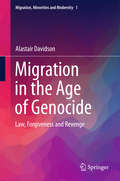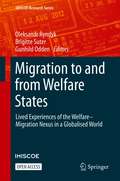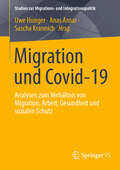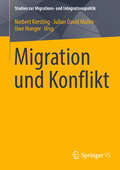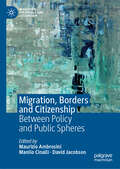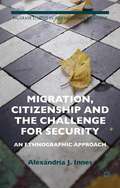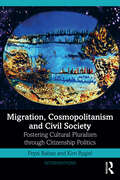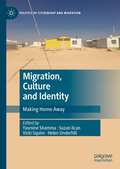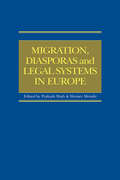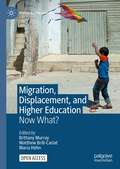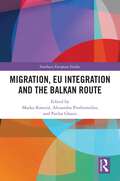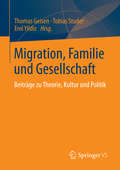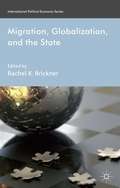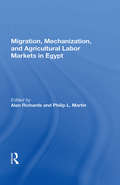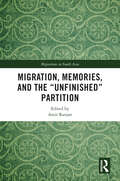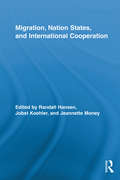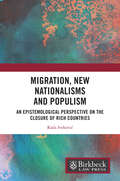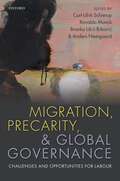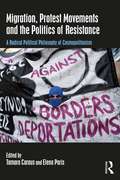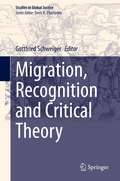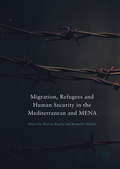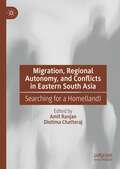- Table View
- List View
Migration in the Age of Genocide
by Alastair DavidsonThis book presents a novel proposal for establishing justice and social harmony in the aftermath of genocide. It argues that justice should be determined by the victims of genocide rather than a detached legal system, since such a form of justice is more consistent with a socially grounded ethics, with a democracy that privileges citizen decision-making, and with human rights. The book covers the Holocaust; genocides in Argentina, South Africa, Rwanda, Latin America, and Australia, as well as crimes against humanity in Italy and France. From show trials to state- enforced forgiveness, the book examines various methods that have been used since 1945 to punish the individuals and groups responsible for genocide and how they have ultimately failed to deliver true justice to the victims. The only way to end this failure, the book points out, is to return justice to the victims. This simple proposition; however, challenges the Enlightenment tradition of Western law which was built on the refusal to allow victims to determine the measure of justice. That would amount, according to Bacon, Hegel, and Kant to a revenge system and bring social chaos. But, as this book points out, forgiveness is only something victims can give, no-one can demand it. In order to establish a lasting peace, it is necessary to re-examine the philosophical and theoretical refusal to return justice to the victims. The engaging argument put forth in this book can help deliver true justice and re-establish international social harmony in the aftermath of genocide. Genocide is ubiquitous in the modern, global world. It's understanding is highly relevant for the understanding of specific and perpetuating challenges in migration. Genocide forces the migration of millions to avoid crimes against humanity. When they flee war zones they bring their fears, hates, and misery with them. So migration research must engage fully with the experience of genocide, its human conseque nces and the ethical dilemmas it poses to all societies. Not to do so, will make it more difficult to understand and live with newcomers and to achieve some sort of harmony in host countries, as well as those which are centers of genocide.
Migration in the Mediterranean
by Ippolito, Francesca and Trevisanut, Seline Francesca Ippolito Seline TrevisanutMediterranean states have developed various cooperation mechanisms in order to cope with the issues that arise from migration. This book critically analyses how institutional actors act and interact on the international scene in the control and management of migration in the Mediterranean. It highlights how, even though the involvement of 'universal' international organisations guarantees a certain balance in setting the goals of cooperation mechanisms and buttresses a certain coherence of the actions, the protection of migrants' fundamental rights is still an objective as opposed to a reality, and security imperatives and trends still prevail in the aftermath of the 2011 Arab Spring.
Migration to and From Taiwan (Routledge Research on Taiwan Series)
by Dafydd Fell Chiu Kuei-Fen Lin PingMigration has transformed Taiwanese society in the last 20 years. The main inflows have been temporary workers from Southeast Asian countries and female spouses from Southeast Asia and China marrying Taiwanese husbands. The main outflow has been migration to China, as a result of increased economic integration across the Taiwan Strait. These changes have significantly altered Taiwan’s ethnic structure and have profound social and political implications for this new democracy. As large numbers of these migrants take Taiwanese citizenship and their offspring gain voting rights, the impact of these "new Taiwanese" will continue to increase. This book showcases some of the leading researchers working on migration to and from Taiwan. The chapters approach migration from a range of disciplinary perspectives, including international relations, sociology, social work, film studies, political science, gender studies, geography and political economy and so the book has great appeal to scholars and students interested in the politics of Taiwan, Taiwanese society and ethnic identity as well as those focusing on migration in East Asia and comparative migration studies.
Migration to and from Welfare States: Lived Experiences of the Welfare–Migration Nexus in a Globalised World (IMISCOE Research Series)
by Brigitte Suter Oleksandr Ryndyk Gunhild OddenThis open access book explores the role of family, public, market and third sector welfare provision for individual and households’ decisions regarding geographical mobility. It challenges the state-centred approach in research on welfare and migration by emphasising migrants’ own reflections and experiences. It asks whether and in which ways different welfare concerns are part of migrants’ decisions regarding (or aspirations for) mobility. Employing a transnational and a translocal perspective, the book addresses different forms of geographical mobility, such as immigration, emigration, and re-migration, circular and return migration. By bringing in empirical findings from across a variety of Western and non-Western contexts, the book challenges the Eurocentric focus in current debates and contributes to a more nuanced and more integrated global account of the welfare-migration nexus.
Migration und Covid-19: Analysen zum Verhältnis von Migration, Arbeit, Gesundheit und sozialen Schutz (Studien zur Migrations- und Integrationspolitik)
by Uwe Hunger Sascha Krannich Anas AnsarDer Band lädt dazu ein, Entwicklungen rund um die Themen Migration, Arbeit, Gesundheit und sozialer Schutz vor dem Hintergrund der COVID-19-Pandemie neu zu überdenken. In den Beiträgen wird deutlich, wie die Pandemie grundsätzliche Probleme der Migration, wie die plötzliche Schließung von Grenzen, schlechte Arbeitsbedingungen und willkürliche Entlassungen von Wanderarbeiter*innen sowie Benachteiligungen bei sozialen Dienstleistungen, wie unter einen Brennglas vergrößert und ihre Dringlichkeit deutlich gemacht hat. Mit dem Abschwächen der Pandemie sind sie damit keineswegs verschwunden, sondern allenfalls wieder aus dem Blickpunkt der öffentlichen Debatten verschwunden. Der Band zeigt auf, wo die Probleme liegen, wo hierfür die Verantwortlichkeiten liegen und wie eine für alle Seiten gewinnbringende Zusammenarbeit von Staaten und anderen Beteiligten möglich ist, um Missstände zu beheben und eine für alle vorteilhafte Migration zu ermöglichen.
Migration und Konflikt (Studien zur Migrations- und Integrationspolitik)
by Norbert Kersting Uwe Hunger Julian David MüllerKonflikte im Bereich Migration nehmen zu: Brennende Asylbewerberheime, Anschläge auf Migant:innen, rassistische Hassrede im Internet, ein Anwachsen rechtspopulistischer xenophobischer Demonstrationen und Parteien. Gerade in solch beunruhigenden Ausprägungsformen treten migrationsbezogene Konflikte häufig in Politik und Medien in Erscheinung und nähren den demokratischen Krisendiskurs. Die demokratie- und ordnungstheoretische Bedeutung sozialer Konflikte reicht allerdings weit über dieses destruktive Erscheinungsbild hinaus. Konflikte sind nicht nur ein unvermeidbares Element gesellschaftlichen Zusammenlebens, die Möglichkeit zur Austragung und Bearbeitung ist in vielen politikwissenschaftlichen Ansätzen gar zu einem Gradmesser demokratischer Qualität avanciert. So werden in diesem Sammelband politische Anerkennungs-, Teilhabe- und Teilnahmekonflikte beschrieben und die Repräsentation von Migrant*innen sowie ihre Einbindung in demokratische Entscheidungsprozesse analysiert.
Migration, Borders and Citizenship: Between Policy and Public Spheres (Migration, Diasporas and Citizenship)
by Maurizio Ambrosini Manlio Cinalli David JacobsonThis edited collection goes beyond the limited definition of borders as simply dividing lines across states, to uncover another, yet related, type of division: one that separates policies and institutions from public debate and contestation. Bringing together expertise from established and emerging academics, it examines the fluid and varied borderscape across policy and the public domains. The chapters encompass a wide range of analyses that covers local, national and transnational frameworks, policies and private actors. In doing so, Migration, Borders and Citizenship reveals the tensions between border control and state economic interests; legal frameworks designed to contain criminality and solidarity movements; international conventions, national constitutions and local migration governance; and democratic and exclusive constructions of citizenship. This novel approach to the politics of borders will appeal to sociologists, political scientists and geographers working in the fields of migration, citizenship, urban geography and human rights; in addition to students and scholars of security studies and international relations.
Migration, Citizenship and the Challenge for Security
by Alexandria J. InnesThis study focuses on the field of security studies through the prism of migration. Using ethnographic methods to illustrate an experiential theory of security taken from the perspective of migrants and asylum seekers in Europe, it effectively offers a means of moving beyond state-based and state-centric theories in International Relations.
Migration, Cosmopolitanism and Civil Society: Fostering Cultural Pluralism through Citizenship Politics (ISSN)
by Feyzi Baban Kim RygielThis book discusses the ways civil society initiatives open communities to newcomers and why, how, and under what circumstances some are more welcoming than others, exploring the importance of transgressive cosmopolitanism as a basis for creating more inclusive and pluralistic societies.The question of how to live together in increasingly multicultural, multi-ethnic, and multireligious societies is a pressing political and policy issue, particularly as we witness a rise in right-wing populism and anti-immigrant sentiments. This book addresses the limitations of approaches that seek to secure borders, preventing the arrival of newcomers altogether, or that vacillate between assimilation and multiculturalism. The authors explore the concept of cosmopolitanism and its utility, by theorizing from real-world examples, including Germany’s Welcome Culture and Denmark’s Kind Citizens movements and other smaller-scale initiatives, such as arts and museum projects, kitchen hubs, and shared living accommodation.Interdisciplinary in nature and bringing conceptual discussions together with everyday examples, this book focuses on forms of activity generally left out of wider debates around protest and social movement literature. It emphasizes different types of activities undertaken by civil society groups, who do not necessarily self-identify as political, but whose activities can counter right-wing populism. This dialogue between concepts and everyday politics makes the volume a very useful companion to classroom discussion and will facilitate its own exchange between scholars, activists, and practitioners.
Migration, Culture and Identity: Making Home Away (Politics of Citizenship and Migration)
by Suzan Ilcan Vicki Squire Yasmine Shamma Helen UnderhillThis book is about homemaking in situations of migration and displacement. It explores how homes are made, remade, lost, revived, expanded and contracted through experiences of migration, to ask what it means to make a home away from home. We draw together a wide range of perspectives from across multiple disciplines and contexts, which explore how old homes, lost homes, and new homes connect and disconnect through processes of homemaking. The volume asks: how do spaces of resettlement or rehoming reflect both the continuation of old homes and distinct new experiences?Based on collaborations with migrants, refugees, practitioners and artists, this book centres the lived experiences, testimonies, and negotiations of those who are displaced. The volume generates appreciation of the tensions that emerge in contexts of migration and displacement, as well as of the ways in which racial categories and colonial legacies continue to shape fields of lived experience.
Migration, Diasporas and Legal Systems in Europe
by Prakash Shah and Werner F. MenskiAt a time when issues concerning migration and the formation of diasporic communities have come to be critical for all European legal systems, this volume reflects, discusses and analyzes the questions raised by diasporas who have established themselves in Europe over more than fifty years of immigration and the challenges faced by legal systems in the light of continued migration. Contributors from a broad range of backgrounds address prominent issues ranging from legal pluralism among minorities, pressures on EU accession states, irregular migration, state control of family reunification and formation in light of human rights laws, challenges for citizenship and nationality laws and the implementation of visa rules and juxtaposed control zones. Besides the EU as a supranational legal order, the book contains discussion of conditions in the United Kingdom, Ireland, France, Spain, Gibraltar, Morocco, Greece, Turkey and Lithuania.This volume accompanies The Challenge of Asylum to Legal Systems and is the second book to emerge from the W.G Hart Legal Workshop held in 2004 at London's Institute for Advanced Legal Studies.
Migration, Displacement and Identity in Post-Soviet Russia
by Hilary PilkingtonThe displacement of 25 million ethnic Russians from the newly independent states is a major social and political consequence of the collapse of the former Soviet Union. Pilkington engages with the perspectives of officialdom, of those returning to their ethnic homeland, and of the receiving populations. She examines the policy and the practice of the Russian migration regime before looking at the social and cultural adaptation for refugees and forced migrants. Her work illuminates wider contemporary debates about identity and migration.
Migration, Displacement, and Higher Education: Now What? (Political Pedagogies)
by Maria Höhn Brittany Murray Matthew Brill-CarlatThis open access book is a nuanced introduction to Forced Migration Studies and a toolkit for faculty and undergraduate students, with a special emphasis on community-engaged learning. Experts from the social sciences, humanities, arts, and experimental sciences offer interdisciplinary perspectives to translate critical analysis into concrete action. The collection highlights activists, artists, and educators who have initiated projects in cooperation with and for the benefit of populations affected by migration and displacement. Together, these contributions powerfully articulate the relevance of the liberal arts and social sciences in preparing students to meet increasingly interconnected global challenges such as forced migration, climate change, and Covid-19.
Migration, EU Integration and the Balkan Route (Southeast European Studies)
by Marko Kmezić Alexandra Prodromidou Pavlos GkasisContributing to our understanding of the impact of the 2015 migrant “crisis” on the future of EU integration, this book views the “crisis” as an accelerant to existing problems, namely Brexit, the growing popularity of anti-immigrant far right parties and the rise of xenophobic and antiliberal governments from the Baltics to the Balkans. Providing analysis at the national, regional level and EU level, this book shows how the countries on the migrant route have been affected according to their degree of integration with the EU and the specific socio-political and economic conditions of each country. The volume will be of interest to scholars or international relations, security studies, border studies, EU policies, migration studies and Southeast European studies.
Migration, Familie und Gesellschaft
by Erol Yildiz Tobias Studer Thomas GeisenModerne Gesellschaften sind durch eine Pluralisierung familiärer Formen und Muster gekennzeichnet. Dies gilt auch für Familien im Kontext von Migration, die meist als ,,traditionelle Familien" wahrgenommen werden. Ein Teil der Veränderungen von Familien im Kontext von Migration steht in engem Zusammenhang mit Veränderungen in den Migrationsprozessen selbst. Diese haben einen Einfluss auf die innere Strukturierung und die Entwicklung der Familien. Vor dem Hintergrund der aktuellen Debatten um ,,Transnationalisierung" und ,,Transkulturalität" untersuchen die Beiträge im vorliegenden Band die Komplexität von Familie im Kontext von Migration und fragen nach der Bedeutung von Migrationspolitiken und dem Umgang mit sozialen und kulturellen Differenzen im Zusammenhang von Familie und Migration.
Migration, Globalization, and the State
by Rachel K. BricknerDrawing evidence from North and South America, Europe, Asia, and the Middle East, the contributors illustrate that even within the common framework of economic globalization, the ways in which the interests of state actors and the agency of migrants intersects continuously shapes and reshapes both home and destination societies.
Migration, Mechanization, And Agricultural Labor Markets In Egypt
by Alan Richards Philip L. MartinAfter a long period of stability, Egypt’s agricultural sector experienced sudden change due to the 1973 oil price increases and Anwar Sadat’s Open Door economic policies. Workers left rural Egypt for the cities and high-wage jobs in the oil-exporting countries. The resulting “labor shortage†and rising real wages in agriculture coincided with a
Migration, Memories, and the "Unfinished" Partition (Migrations in South Asia)
by Amit RanjanThis book looks at migration through the lens of the Partition of India in 1947. The Partition uprooted millions of people from their homelands. This volume examines the initial difficulties faced by the refugees in settling down in their adopted land. It analyses the state’s efforts in facilitating the movement of refugees, the processes it initiated to resettle them after Partition, and the extent to which it was successful. This book also investigates the links between socio-political developments in contemporary India, Pakistan, and Bangladesh as a result of the Partition.Drawing on archival sources, oral histories and literary representations, the contributing authors discuss and analyse the experiences of the migrated population. Part of the Migrations in South Asia series, this book will be an important read for scholars and researchers of migration studies, refugee studies, Partition studies, Indian history, Indian politics, and South Asian studies.
Migration, Nation States, and International Cooperation (Routledge Research in Transnationalism)
by Randall Hansen, Jobst Koehler, and Jeannette MoneyAgainst a background of past, limited examples of international cooperation, and ambitious hopes for extensive future efforts, this volume puts two related questions to the empirical test: under which conditions are states prepared to cooperate over international migration, and what form - bilateral, multilateral, formal, informal - will this cooperation take?
Migration, New Nationalisms and Populism: An Epistemological Perspective on the Closure of Rich Countries
by Rada IvekovicThis book examines the antagonistic relationship between new European nationalisms as these often go hand-in-hand with populism, and the phenomenon of migration. Migration has become a significant issue both in Europe and the whole world. Although it has always existed, much of public opinion sees it now as a problem. The latter has been exaggerated through a crisis in hospitality exacerbated by the relatively recently constructed and misplaced feeling of a civilisational threat from islam. Migration is then countered by the escalation of new nationalisms, at least some of which are supported by populism. This book offers an understanding of this conjunction of migration and nationalism in the post-cold war European context. More specifically, the book takes up how the end of the simplified cold war cognitive binary means an unprecedented epistemological confusion and depoliticisation which takes migration as its target, but could resort to other targets too. Discussing the postcolonial background to the new migrations, the book also considers womens' rights, postsocialism and the relevance of the current pandemic, as the issue of migration is addressed in the context of the European crisis-ridden present. This wide-ranging interrogation of how contemporary European migration is conceived and understood will appeal to students, academics, activists, policy makers, and others with interests in contemporary migration, new nationalisms, populism, feminism, colonial, postcolonial, and decolonial issues, as well as socialism and postsocialism.
Migration, Precarity, and Global Governance: Challenges and Opportunities for Labour
by Ronaldo Munck Anders Neergaard Carl-Ulrik Schierup Branka Likić-BrborićMigration, Precarity, & Global Governance explores an understudied, but central, area within contemporary studies of globalisation and precarisation. It relates to the interface between migration, global governance and the role of civil society, with particular focus on the dilemmas and options of trade unions, too often left off the agenda. The volume suggests that the trade union movement is undergoing a fundamental debate about revitalisation, which could play an important role in terms of the economic, political and social integration of migrant workers, with implications for the transformation of contemporary societies in general. The volume adopts an interdisciplinary and comparative approach, emphasizing the complexity of historically grounded social relations. It examines international migration as it is impacted by, and impacts on, globalization, social and political struggles, and the recurring crisis of capitalism. The first part of the book presents five complementary perspectives on the political economy of migration, labour, and citizenship. Part Two offers analyses of the relationship between labour unions and migrant workers. Part Three explores the way trade unions, migrant organisations, and other civil society groupings interact with an incipient global governance regime relating to migration. It also examines issues of state and non-state actors' accountability in relation to human rights claims as well as the impact of the norm of corporate social responsibility.
Migration, Protest Movements and the Politics of Resistance: A Radical Political Philosophy of Cosmopolitanism
by Tamara Caraus Elena ParisMigration and cosmopolitanism are said to be complementary. Cosmopolitanism means to be a citizen of the world, and migration, without impediments, should be the natural starting point for a cosmopolitan view. However, the intensification of migration, through an increasing number of refugees and economic migrants, has generated anti-cosmopolitan stances. Using the concept of cosmopolitanism as it emerges from migrant protests like Sans Papiers, No One Is Illegal, and No Borders, an interdisciplinary group of scholars addresses this discrepancy and explores how migrant protest movements elicit a new form of radical cosmopolitanism. The combination of basic theoretical concepts and detailed empirical analysis in this book will advance the theoretical debate on the inherent cosmopolitan aspects of migrant activism. As such, it will be a valuable contribution to students, researchers and scholars of political science, sociology and philosophy.
Migration, Recognition and Critical Theory (Studies in Global Justice #21)
by Gottfried SchweigerThis book brings together philosophical, social-theoretical and empirically oriented contributions on the philosophical and socio-theoretical debate on migration and integration, using the instruments of recognition as a normative and social-scientific category. Furthermore, the theoretical and practical implications of recognition theory are reflected through the case of migration. Migration movements, refugees and the associated tensions are phenomena that have become the focus of scientific, political and public debate in recent years. Migrants, in particular refugees, face many injustices and are especially vulnerable, but the right-wing political discourse presents them as threats to social order and stability. This book shows what a critical theory of recognition can contribute to the debate. The book is suitable for researchers in philosophy, social theory and migration research. "A profound examination of how states and societies struggle to recognize migrants as fellow human beings in all their fullness. The contributions are exceptional for combining astute philosophy and social theory with a discussion of actual politics and real lives."Dr. Hugo Slim(Senior Research Fellow at the Blavatnik School of Government, University of Oxford and formerly Head of Policy at the International Committee of the Red Cross) “This impressive and timely volume offers an innovative way of understanding the issues of migration and integration by using a critical theory of recognition. Recognition theory has rich potential for effectively responding to the issues of autonomy, identity, integration, and empowerment that are at the core of the current public debates on mass migration, displacement, and the refugee crisis. By examining the normative and policy implications of recognition as they apply to migration, the book offers a pathbreaking look at the human dimension of the debate.”Dr. Helle Porsdam(Professor of Law and Humanities and UNESCO Chair in Cultural Rights University of Copenhagen)
Migration, Refugees and Human Security in the Mediterranean and MENA
by Kenneth Christie Marion BoulbyThis book focuses on the Mediterranean/MENA migration crisis and explores the human security implications for migrants and refugees in this troubled region. Since the Arab uprisings of 2010/2011, the Middle East and North Africa region has experienced major political transformations and called into question the legitimacy of states in the region. Displaced populations continue to suffer due to the major conflicts in Syria, Iraq and elsewhere, causing fragmentation and dis-integration of communities. Contributors to this volume analyze how and why this crisis differs significantly from previous migration/refugee flows in the region, explain the historical and political antecedents of this crisis which have played a part in its shaping, and explore the relationship between human security and the protection of vulnerable individuals and groups.
Migration, Regional Autonomy, and Conflicts in Eastern South Asia: Searching for a Home(land)
by Amit Ranjan Diotima ChattorajDelving into the past and present of various secessionist movements in Northeast India, political conflict in Chittagong Hill Tracts in Bangladesh, a political movement for autonomy in Darjeeling hills in Eastern India, and the Rohingya migration crisis affecting India and Bangladesh, this book examines the volatile co-existence of competing population groups in Eastern South Asia. Through the conceptual lens of the ‘home’ and feeling of ‘homeland’ in Eastern South Asia, the authors seek answers to three complex but interrelated questions: why is Eastern South Asia facing so many political movements and conflicts? How have the political movements affected the region and people? Why is the number of migrants in this region so high? Answers to these questions are vital to those studying South Asia and interested in understanding this region.
